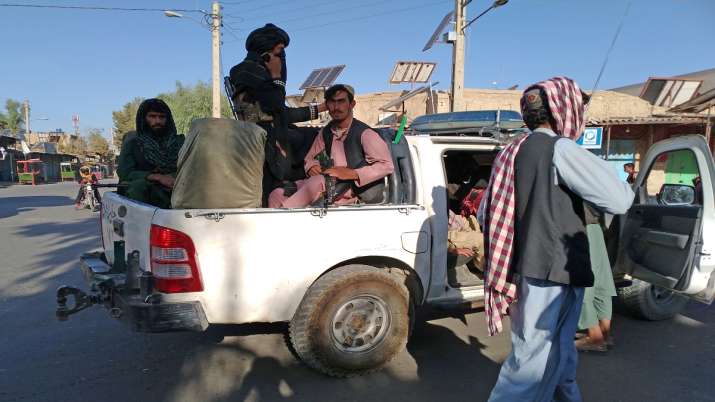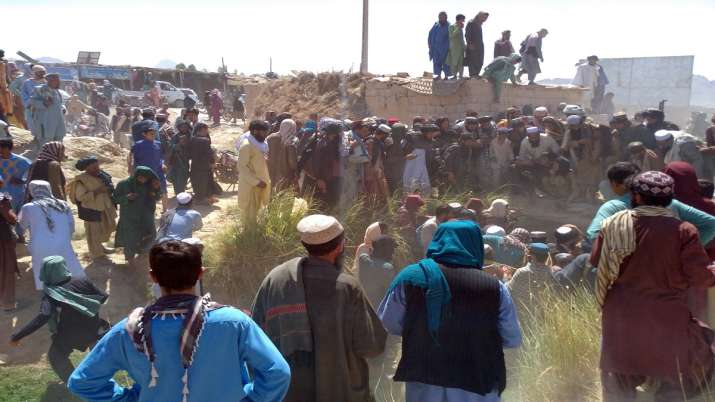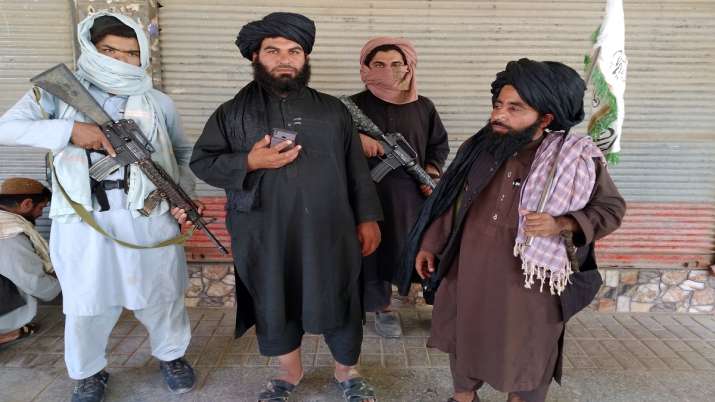
Taliban fighters patrol inside the city of Farah, the capital of Farah province, southwest of Kabul, Afghanistan.
The Taliban have captured three more provincial capitals and a local army headquarters in Afghanistan, officials said on Wednesday, completing its offensive in the country’s northeast and repressing its offensive. The rebels now control some two-thirds of the country as the US and NATO finalize their withdrawal after decades of war.
The fall of the capitals of Badakhshan and Baglan provinces to the northeast and Farah provinces to the west increased pressure on the country’s central government to stem the tide of the advance, even as it lost a major base in Kunduz. Went. Afghan President Ashraf Ghani arrived in Balkh province, already surrounded by Taliban-held territory, to help drive the rebels back from warlords accused of atrocities and corruption. He also changed his army chief.
While the capital of Kabul is not directly threatened in advance, the surprising speed of the offensive raises questions about how long the Afghan government can maintain control of its countryside. Several fronts of fighting have pulled the government’s special operations forces – while regular soldiers have often fled the battlefield – and violence has prompted thousands of civilians to seek safety in the capital.
The US military, which plans to complete its withdrawal by the end of the month, has conducted some air strikes but largely refrained from engaging itself in ground operations. The Afghan government and military did not respond to repeated requests for comment about the damage.
The success of the Taliban attack also raises questions about whether they will rejoin long-stalled peace talks in Qatar aimed at moving Afghanistan towards an inclusive interim administration, as the West had hoped.
Taliban fighters and Afghans gather around the body of a member of the slain security forces inside the city of Farah, the capital of Farah province in southwest Afghanistan.
Humayun Shahidzada, a legislator from the western province of Farah, confirmed to The Associated Press on Wednesday that the capital of his province has fallen under the same name. Neighboring Nimroj province was captured in recent days after a week-long operation by the Taliban.
In Farah, Taliban fighters dragged the ruthless, bloody corpse of an Afghan security force member across the street, shouting: “God is great!” Taliban fighters were driving Humvis and Ford pickup trucks carrying M-16 rifles donated by the Americans.
A Taliban fighter who did not wish to be named said “the situation in the city is under control, our mujahideen are patrolling the city,” describing his fellow insurgents as “holy warriors”.
Firing with automatic weapons continued throughout the day in Farah.
Badakhshan legislator Hujtullah Kherdamand said the Taliban had captured Faizabad, the capital of his province. An Afghan official, who spoke on condition of anonymity about an unintentional loss, said Baglan’s capital, Poli-Khumri, also fell.
The rebels had previously captured six other provincial capitals in the country in less than a week.
On Wednesday, the headquarters of the Afghan National Army’s 217th Corps at Kunduz airport fell into the hands of the Taliban, according to Ghulam Rabani Rabani, member of the provincial council in Kunduz and MP Shah Khan Sherzad. The rebels posted videos online that they said showed soldiers surrendering.
Taliban fighters patrol inside the city of Farah, the capital of Farah province, southwest of Kabul.
The corps is one of seven across the army and its loss represented a major setback. The capital of the province, also known as Kunduz, was among those already seized, and the capture of the base now puts the country’s northeast firmly in the hands of the Taliban.
It was not immediately clear what equipment was left for the insurgents, although a Taliban video showed them parading in Humvees and pickup trucks. Another video showed fighter jets on the airport’s tarmac next to an attack helicopter with no rotor blades.
Ataullah Afghan, the head of the provincial council, said a suicide car bomber targeted the government-held police headquarters in southern Helmand province, where the Taliban control nearly the entire capital of Lashkar Gar. The building has been under siege for two weeks.
The rapid collapse of wide areas of the country for the Taliban raises fears that the brutal tactics they used to rule Afghanistan earlier will also return. Some civilians fleeing the Taliban have said the insurgents imposed repressive restrictions on women and burned schools. There have also been reports of revenge in areas where the Taliban have gained control.
Speaking to reporters on Tuesday, a senior EU official said rebels captured 230 of the 400 districts in Afghanistan. The official described another 65 as under government control while the rest were contested. The official spoke on condition of anonymity to discuss internal figures.
Apart from the northeast, much of northern Afghanistan, except Balkh province, has also gone into the hands of the Taliban. There, warlords Abdul Rashid Dostum, Atta Mohamed Noor and Mohamed Mohakik planned to mobilize forces to support the Afghan government to push back the Taliban.
Dostum in particular has a troubled past, facing scrutiny after the 2001 US-led invasion that killed hundreds of Taliban fighters by suffocation in sealed shipping containers last year.
On Wednesday, Dostum said the Taliban “will not be able to leave the north and face the same fate as suffocating soldiers”.
Ghani meanwhile ordered General Hibatullah Alizai to replace General Wali Ahmadzai as Afghan army chief, according to an Afghan official who spoke to AP and local media reports. The Defense Ministry official spoke on condition of anonymity as the decision was yet to be made public.
Alizai was the commander of the Afghan Army’s Special Operations Corps – elite soldiers who were forced to do most of the fighting alongside the Air Force as the regular army collapsed.
After 20 years of Western military missions and billions of dollars spent and training Afghan forces, many are bound to explain that collapse.
As the international community hopes for a return to peace talks, US envoy Zalmay Khalilzad warned the Taliban on Tuesday that any government coming to power through force in Afghanistan would not be recognized.
Read also | Taliban capture Afghan city connecting Kabul to the north
Read also | US signals no change in airstrikes as Afghan Taliban advance
.

